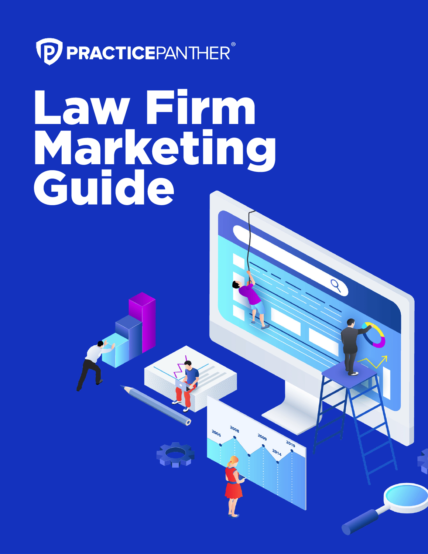Lawyers have been creating blogs since the early days of the internet, and it’s easy to understand the appeal. Writing has always been central to the legal profession, and blogs offer an opportunity to connect with clients while showcasing expertise in a more accessible format.
That said, for attorneys who are used to drafting legal briefs rather than casual blog posts, starting a blog might seem daunting. The good news is that blogging isn’t an impossible skill to learn — it’s one that improves with practice. With some effort and the right approach, you can develop your writing skills for an online audience and become confident in sharing your insights.
Thinking about starting a law firm blog? Here’s what you should know to get started.

First, Why Should You Care About Legal Blog Writing?
Blogs have become nearly universal, popping up on websites of all kinds. But what’s behind their popularity? A few practical reasons explain why so many law firms are investing in blogging:
- Improving online search rankings: Regularly adding new content to a blog can help your website rank higher on Google and other search engines. This practice can bring more potential clients to your firm.
- Engaging with clients: People spend almost 7 hours online each day, so being an online presence yourself is a great way to find new clients. A blog can give clients an easy way to connect with your firm and learn more about your expertise.
- Enhancing your professional reputation: In the legal world, trust and authority matter. Blogging allows you to demonstrate your knowledge, helping to position your firm as a reliable source of information.
These reasons have inspired many lawyers to embrace blogging. If you’re considering starting your own, keep a few helpful tips in mind to get off to a strong start.
1. Know Who You’re Writing For
Before starting your blog, think about the people you want to reach. Are you speaking to other attorneys with a strong legal background to build a strong network? Or are you hoping to help prospective clients who might be unfamiliar with legal terms and procedures?
Your audience shapes how you write and the topics you focus on. For instance, if your readers are potential clients, it’s best to explain things clearly and avoid complicated legal language. Many people turn to blogs for straightforward answers, so keeping things accessible can make a big difference. On the other hand, if your audience is other lawyers, they may appreciate more detailed discussions about case law or recent developments in your practice area.
Knowing your audience also makes it easier to choose topics that matter to them. For example, you could write about common legal issues people face, such as handling a contract dispute or understanding how probate works. If you’re writing for peers, you might explore trending legal topics or offer advice on managing specific types of cases.
2. Stay Focused in the Legal Blog Topics You Choose
It’s tempting to write about a little bit of everything on your law firm blog, but narrowing your focus can make a bigger impact. Instead of trying to appeal to everyone, concentrate on one area where you can offer detailed and relevant advice.
For instance, if you practice real estate law, consider writing about local property regulations in your city or state. A blog centered on rental disputes in San Francisco or zoning issues in Chicago will connect with readers who are actively dealing with those challenges. If you’re not sure where to start, check out some of the top legal blogs in your niche to see what the current trends are.
Even though a targeted blog might not attract as many readers overall, the people it does reach are more likely to need your expertise. Building trust with a smaller, more engaged audience often leads to stronger connections and better results for your practice.

3. Longer Blogs Aren’t Always Better
What is a good length for a blog post? Blogging doesn’t have to be a marathon of long paragraphs and detailed explanations. In fact, most readers prefer shorter posts that deliver useful information in an easily digestible manner. While some blogs can run up to 2,000+ words, many effective ones are far shorter.
Most people who read blogs online are skimming for highlights rather than reading every word. If your post is packed with long blocks of text, they’re likely to lose interest. To keep their attention, the top legal newsletters and blogs aim for a format that’s easy to digest, even when the topics are complex.
Break your posts into sections with clear headings and keep paragraphs short — three or four sentences at most. Bulleted or numbered lists can also help present information clearly without overwhelming the reader. These techniques make your blog more inviting and increase the chances that your audience will stick around to read what you have to say.
4. Stick to a Regular Schedule
Consistency is one of the most important factors in maintaining a successful blog. Even if your content is engaging and well-written, sporadic posting can hurt your chances of building a loyal audience. Readers are more likely to return when they know new content will be available regularly.
You don’t need to commit to a rigid schedule, but having a general posting routine helps. For example, you might decide to publish a new post every two weeks or aim for four legal articles a month. The schedule itself isn’t as important as sticking to it. Regular updates show readers — and search engines — that your blog is active and worth following.
Consider creating a content calendar to help you stay on track. Planning your topics ahead of time makes it easier to stay organized and consistently provide valuable content. If you have legal practice management software like PracticePanther, the calendar feature can help maintain your blogging schedule. You can set up reminders, use automated workflows to track blog progress, and even assign tasks to team members if others are helping you manage your firm’s blog.
5. Write with Search Engine Optimization (SEO) in Mind
Writing for your readers should always come first, but optimizing your blog for search engines can help more people find your content. A few simple steps can make a big difference in improving your blog’s visibility.
Use keywords that reflect what your ideal audience is searching for. Instead of choosing broad terms like “family law,” you could focus on something more specific, such as “child custody laws in Atlanta.” Placing these keywords naturally throughout your posts helps search engines understand your content and connect it with relevant searches.
Tracking your blog’s performance is also important. Tools like Google Analytics can show you how much traffic your site gets, which posts are popular, and how long readers are staying. These insights can help you adjust your strategy to focus on what’s working best.
Blogging offers lawyers a chance to share their expertise while building meaningful connections with readers. Following these tips can help your law firm create a blog that engages your audience and stands out in the legal field.




